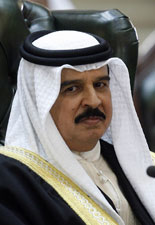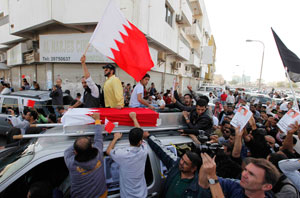Of the new revolutionary eruptions, post-Egypt, perhaps the most problematic for Washington is the upsurge in Bahrain, where a Sunni king has long ruled over his predominantly Shi'ite subjects.
King Hamad is a corrupt tyrant whose disregard for basic human rights was underscored by the actions of his security forces in storming a protest encampment in the capital city's main square, murdering five protesters in a surprise assault in the dead of night, and wounding over 200. There are indications that at least some of the assailants were Saudis. Bahrain, a small island kingdom in the Persian Gulf, is connected to Saudi Arabia by a causeway.
 |
| Bahrain's King Hamad bin Issa al-Khalifa. AFP |
In recent years, the government has bowed to American pressure to at least put on a façade of "democratic" reform, but the changes Hillary Clinton praised in her visit to Bahrain a few months ago were merely cosmetic: the elected parliament is still an advisory body, corruption is pandemic, and citizens have no say in how they are governed or by whom.
Indeed, it seems that the much-touted "reform" supposedly undertaken in the country at Washington's request is merely a façade for political manipulation and high-end thievery. In Bahrain, torture of political dissidents is routine.
The protesters aren't seeking the overthrow of the al-Khalifa monarchy, as far as I can tell: their demands are limited to the firing of King Hamad's uncle, Sheikh Khalifa bin Salman al-Khalifa, whose term of office as prime minister has dragged on now for 40 years. Sheikh Khalifa, a major landowner, has come to symbolize the ill-gotten gains of the royal family, which virtually owns the entire country outright.
As in Tunisia, where the weight of dictator Ben Ali's family laid heavily on the country's sinking fortunes - and as in Egypt, too, where the Mubarak clan had some $70 billion socked away in Swiss bank accounts - resentment over this massive thievery has boiled over into revolution.
However, few premonitions of trouble seem to have ever penetrated the walls of the US embassy in Manama, the capital, where US diplomats, as recently as December, 2009, reported that everything was coming up roses. One diplomatic cable, brought to us by Wikileaks, tells us the king is "personable and engaging," and has "overseen the development of strong institutions" - although I doubt the diplomat who wrote that had this in mind. "I've just been beaten by a gang of thugs," said ABC reporter Miguel Marquez as he was assaulted by Bahrain government forces - which just about sums up the US position in the region, where the Americans are invariably on the side of the thugs.
Bahrain is a key element of the administration's strategy against Iran: it is the headquarters of the Fifth Fleet, and will be the linchpin of any future military action in the Gulf by US forces. Simply put, the Empire cannot afford to lose Bahrain. "Bahrain is a friend and an ally and has been for many years," intones our Secretary of State: "We call on restraint from the government, (and) to keep its commitment to hold accountable those who have utilized excessive force." The King has promised to investigate the killings - which is like Mubarak promising to investigate the killings committed by pro-government thugs in Egypt. Good luck with that, Hillary.
 |
| The body of a protester, who was killed by riot police, is taken for burial as his family members and supporters follow a march in Sitra, east of the Bahraini capital of Manama on Friday. Reuters |
Go here for an overview of the political landscape in Bahrain: in short, the terrain is characterized by a great sectarian divide between the Sunni elite and the Shi'ite majority. Shi'ites claim that the government discriminates against them in public sector employment, business regulation, and the granting of housing subsidies. The opposition demands a revised constitution, to be written and voted on by a body of elected delegates.
They also claim the government is bringing in Sunnis from outside Bahrain and granting them citizenship in order to bolster the ruling elite's political base: the country is less than 30 percent Sunni.
Bahrain has been a more compliant puppet than even Mubarak's Egypt: while Wikileaks cables from Cairo complained that the Egyptian military still seems to consider Israel its principal enemy, US diplomats in Manama report no such ambiguity in Bahrain's ruling circles. The Bahraini government was the first Arab country to send an ambassador to "liberated" Iraq, and US officials have praised them for cuddling up to the Israelis. King Hamad has been agitating for a US attack on Iran almost as strenuously as the Israelis, albeit less publicly. On a visit to the country, General David Petraeus met with the King, who, according to a US diplomatic cable,
"Pointed to Iran as the source of much of the trouble in both Iraq and Afghanistan. He argued forcefully for taking action to terminate their nuclear programme, by whatever means necessary. 'That programme must be stopped,' he said. 'The danger of letting it go on is greater than the danger of stopping it.' King Hamad added that in light of these regional developments, Bahrain was working to strengthen GCC coordination and its relations with allies and international organisations. He specifically mentioned NATO and confirmed that Bahrain had agreed to the Alliance's request to use Isa Airbase for AWACS missions, although the details on numbers and timing have yet to be discussed."
The US is going to need this kind of political support, as well as the strategic military advantage afforded by Bahrain in any future conflict with Iran. Yet in the wake of the Pearl Square massacre, and the continuing crackdown, the price for that support is going to be rather high -- so high that it hardly seems worth paying. On another visit by Petraeus, in which he met with the king, Hamad is reported to have said:
"Bahrain had received a message from Iranian FM Mottaki, urging regional governments to support the efforts of Iran, Iraqi insurgents, Hamas, Hezbollah, Taliban and Syria to drive American forces from the Gulf. The King commented: &With friends like these, who needs enemies?"
US diplomats might now turn the king's question back on him, and ask: with friends like you, who needs enemies?
Perhaps anticipating this, it looks like the king had his alibi ready as far back as 2008, when the meeting took place:
"King Hamad related the report that Bahrainis were receiving training from Hezbollah in Lebanon, but admitted he had no definitive proof. He also speculated that the Syrian government was complicit, and must be helping these Bahrainis travel without passport verification as tourists."
Expect any day now to hear that Hezbollah -- Bahrain's stand-in for the Muslim Brotherhood -- is behind what's happening in the country. In that case, refer to the appended comment in the WikiLeaked diplomatic cable, which reads:
"Post has heard versions of this theory from Bahraini officials in the past, but despite our requests the GOB has been unable to provide convincing evidence."
The rebellion in Bahrain is a dagger pointed at the heart of the War Party's campaign against Iran, and more: it is a sword of Damocles hanging over the heads of the House of Saud. Right across the King Fahd causeway, in the oil-rich Eastern province, are as many as two million Shi'ites, who live and work atop the world's greatest concentration of oil reserves and around 90 percent of Saudi oil production. The predominantly Shi'ite workers who work those oil fields are the key to the Kingdom's wealth and future stability, and the Saudi kleptocrats cannot afford to let a Shi'ite uprising in Bahrain succeed.
Bahrain -- and Saudi Arabia -- are the weak underbelly of the elaborate US security structure in the region. In place since Franklin Delano Roosevelt cemented the US alliance with the House of Saud, in 1943, it may all be coming undone -- and in very short order.
Justin Raimondo is the editorial director of Antiwar.com. He is the author of An Enemy of the State: The Life of Murray N. Rothbard (Prometheus Books, 2000), Reclaiming the American Right: The Lost Legacy of the Conservative Movement (ISI, 2008), and Into the Bosnian Quagmire: The Case Against U.S. Intervention in the Balkans (1996). |



